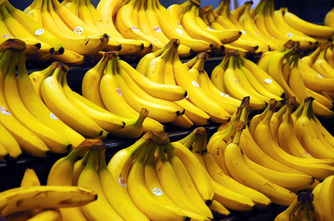 We’ve all seen those advertisements lurking on the sides of websites: “Eat this one food to lose weight fast!” “Lose your belly fat by eating this [weird] fruit!” “The one food that ruins your diet and shortens your life!” The implication is that there’s one secret food that we can eat – or not eat – that will magically cure -- or cause -- all of our health problems. You might think that the “one weird food” advertisements are a recent invention, but the idea of a single, cure-all food is actually quite old. In “The Gluten Lie: And Other Myths About What You Eat,” Alan Levinovitz describes how, starting in the early 1900s, bananas were marketed as the cure for everything from celiac disease to weight loss to infant colic. With the enthusiastic support of the United Fruit Company, an obvious beneficiary of more banana consumption, doctors like Sidney Haas began experiments in which they fed their patients with celiac disease strict diets of banana and milk, supplemented with a few other foods. Noted improvements in patients’ symptoms were attributed to a mysterious enzyme in bananas that was “capable of hydrolyzing” starch. Bananas soon gained a reputation for being a cure-all for celiac disease and other things. A pediatrician named William Brady claimed in the 1960s that babies fed banana starting at the age of two weeks never “had a ‘colic’, a laxative, an enema or a suppository, and at the age of five or six weeks they all slept through the night.” Sign me up!
We’ve since recognized that celiac disease can only be controlled – not cured – by avoiding the gluten protein found in wheat, rye, and barley. The American Academy of Pediatrics now recommends that parents wait until babies reach 6 months of age before feeding them solid foods like bananas. But the notion that a single food can cause or cure health problems endures. This phenomenon may be encouraged by the internet; list-style articles like “25 Fattening Foods You Should Never Eat” and “7 Foods You Should Eat Every Day” are quick ways for the authors of online publications to generate content and page clicks. They also appeal to our very human desire for quick and easy solutions. Rather than make major changes to our diets and lifestyles, these articles and advertisements suggest that all we need to do to lose weight or lower our cholesterol is to never eat a specific food – or to eat it every day. Reality, of course, is more complicated. Eating bananas for every meal is ultimately just as unhealthy as eating only cupcakes. In its “Healthy Eating Plate,” the Harvard School of Public Health recommends eating a wide range of nutrient-rich foods, and avoiding – but not eliminating – refined grains, saturated fats and processed meats. While it may be somewhat disappointing that no single food can cure everything that ails us, we can at least enjoy a variety of healthy foods, along with the occasional treat. And we should enjoy bananas. We just shouldn’t expect them to deliver us from all health evils.
0 Comments
Your comment will be posted after it is approved.
Leave a Reply. |
©2017 WeighingInBlog. All rights reserved. 401 Park Drive, Boston, MA




 RSS Feed
RSS Feed

